Burkina Faso’s President Blaise Compaore says he will stay in power for a year under a transitional government, following a day of violent protests demanding his resignation.
Further, contained in a press statement signed by its Chairman, President John Mahama of Ghana, the Economic Community of West African States (ECOWAS) has warned the people of Burkina Faso that it will not “recognize any ascension to power through non constitutional means,” in the midst of the current political turmoil.
President Mahama said ECOWAS has followed with “grave attention, the events unfolding in Burkina Faso and the tension around the process leading to the consideration of the draft bill on constitutional amendment,” that is, to extend another presidential term for the incumbent.
Earlier, demonstrators angered by President Blaise Compaore bid to extend his 27-year rule, torched parliament and government buildings in Burkina Faso.
Members of Parliament had to suspend the vote on changing the constitution to allow Mr Compaore to stand for re-election next year.
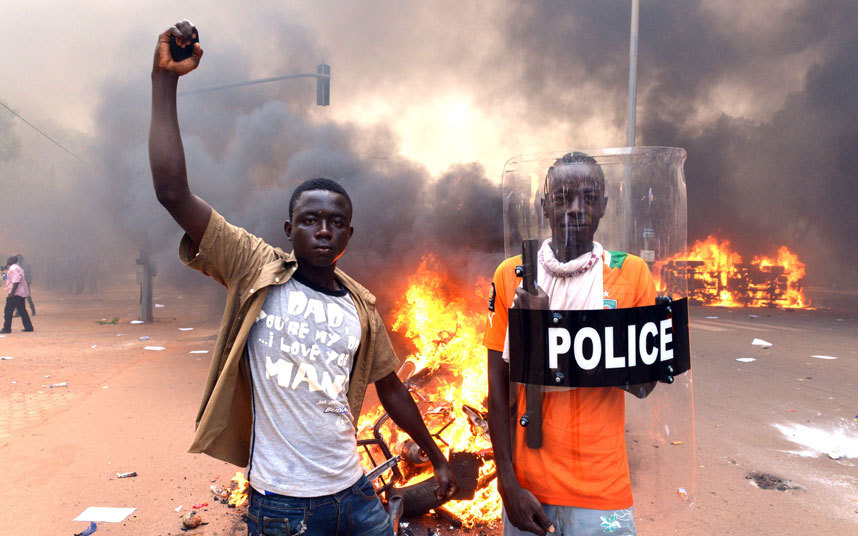
Mr Compaore first took power in a coup in 1987, and has won four disputed elections since then.
In all these elections, ECOWAS has done nothing to review or investigate Mr Compaore and any allegations of election fraud. Rather they have kept mum for years.
Under pressure from protestors around the country, Mr Compaore has said he was now ready to open a political dialogue to set the terms of a transitional government that he would lead until the next presidential election. His current term ends in November next year, so staying in power now would be legal, he claims.
But would he be legitimate?
Opposition leaders and protesters say no. They want him to step down now.
President Compaore appeared to want to calm things down but he spoke like a man who still wants to decide when he goes.
His plan to seek re-election triggered demonstrations in the capital, Ouagadougou. The protests are the most serious yet against Mr Compaore’s 27 year rule.
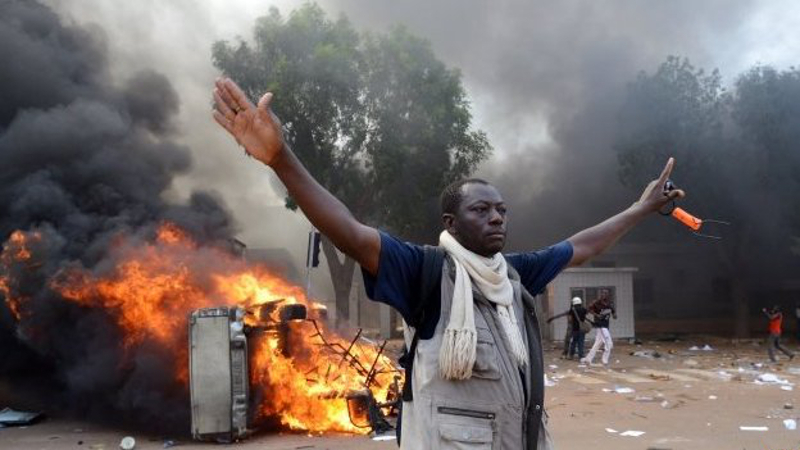
The main opposition leader, Zephirin Diabre, had told a local radio station the state of emergency imposed by the army was unacceptable.
We are calling on the people to show that they are against it. The resignation of President Blaise Compaore is the only thing that can bring peace to the country.
At least one person has been killed in the protests, says BBC Afrique’s Yacouba Ouedraogo in the capital.
Mr Diabre said dozens of protesters had been killed across the country by the security forces in a “barbaric escalation of violence”.
The military fired live bullets to try to disperse protesters who had occupied parliament.
Protesters also surged towards the presidential palace, and a government helicopter flying overhead fired tear gas at them, Reuters news agency reported.
Witnesses say dozens of soldiers joined the protest in Ouagadougou’s main square, including a former defence minister, Gen Kouame Lougue.
Protesters demanded his installation as president, a BBC reporter is quoted to have said.
In step with responding to the demands of protestors mainly in Ouagadougou, President Mahama and ECOWAS claim they have taken note of the decision by the government to withdraw the passing of the bill to keep Mr Compaore in office beyond his 27 years, of which, he has nothing to show for.
And that could be the recipe for more unrest.
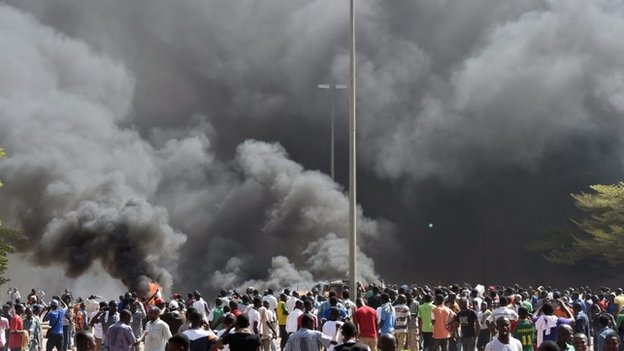
Mr Compaore said he would only hand over power once the transitional government had completed its 12-month term.
President Mahama also added, notoriously in agreement with Mr Compaore, that ECOWAS believes that this decision is geared towards preserving the stability and peace in the country.
ECOWAS has, therefore, called on the people of Burkina Faso to remain calm and law abiding, and also called on the security forces to respect and act in accordance with the constitution of the Republic.
It also called on all the parties involved, notably the entire political class to embrace dialogue with a view to arriving at a political consensus that will lead to free, fair and credible election consistent with constitutional provisions.
But the ECOWAS statements portray merely an academic delivery of a speech by a Chairman who also lacks any widespread political support in his own country, Ghana. The intentions of ECOWAS leaders are often terribly misguided and their responses to such calls for fairness in elections in many West African countries are almost always too late to arrive and too little to leave any lasting impact.
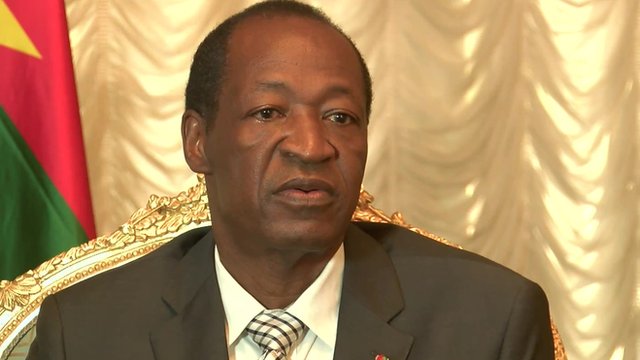
- Served under President Thomas Sankara as minister of state to the presidency
- Took power after Sankara was killed in mysterious circumstances by a group of soldiers in 1987
- First elected president in 1991 and again in 1998
- A new constitution in 2000 limited presidents to two terms in office, and limited terms to five years
- Won two further terms
- Protests at attempts to amend the term limits began a year ago, fuelled by the high cost of living
A press conference by army chief of Burkina Faso General Honore Traore announced that a “transitional body [would] be put in place in consultation with all parties,” for this so-called transitional period.
“A return to the constitutional order is expected in no more than 12 months,” he said.
UN chief Ban Ki-moon’s special envoy for West Africa, Mohamed Ibn Chambas, will fly to Burkina Faso on Friday to try to ease the crisis, the UN has said.

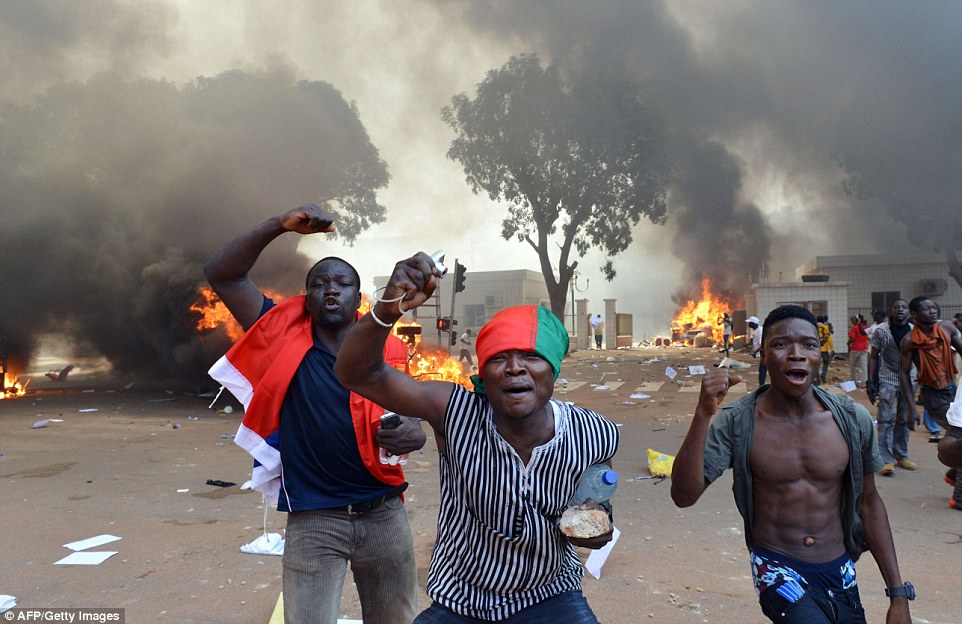









Kudos to the Burkinabe. They have shown they want to define their own destiny.
Now is the time to cleanse the country of the Blaise rot!
Why? Is this how you want to practice Democracy? Crowd or Blaise?
Time to disappear corrupt killer, unpatriotic foolish Blaise!